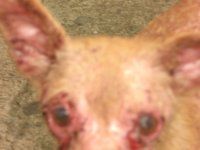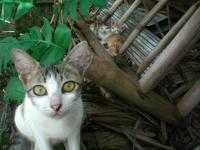Grains Should Not Be Fed To Dogs and Cats
Animal protein (meat) is, relatively speaking, quick to digest. On average, it is said that dogs and cats digest the meat they eat within 10 hours. It has also been reported that dogs and cats produce hydrochloric acid in their stomach that is 15 times stronger than in humans. This high level of acidity helps to digest the meat fast, kill bacteria, etc — the traits of a carnivore.
Grains (brown rice, etc) are, relatively speaking, harder to digest and thus also slow to digest.
If you have not yet read that carnivores have a really big stomach, then please do so before continuing so you can fully digest — pun intended — the information on this page.
A dog is a carnivore and like all carnivores that eat meat, their stomach is about 65% of their digestive system while the intestinal tract is about 35% of their digestive system.
Now a horse or a cow, which is a herbivore, eats vegetation has a stomach that is about 15% of its digestive system and intestinal tract that is about 85% of its digestive system. Reportedly, herbivores have almost 60,000 times more enzymes than humans to digest the vegetation they eat. Whether or not herbivores have 60,000 times more enzymes is something I cannot verify. What really matters is that we simply understand there is a difference between carnivores and herbivores.
Anyway, as a result of a large stomach and short intestinal tract, a carnivore is meant to eat big meals, sometimes as much as 25% of their own body weight, hold the meat in their stomach and then pass it to their intestinal tract, usually in about 10 hours. Since meat is, relatively speaking, quick to digest, the short intestinal tract of the carnivore allows the meat to come in and go out before any putrefaction happens yet also being fully digested.
A cow or a horse has a small stomach and so they are grazers. Their small stomach does not allow them to eat a large meal, but rather they have to eat small meals constantly. After the food leaves their stomach, it enters their super long intestinal tract. Since the vegetation takes a long time to digest, the super long intestinal tract allows the food to be digested slowly but surely. Since a herbivore is a vegetarian and not a meat eater, the vegetation can go through the intestinal tract and stay within the it for a long time and not begin to rot or putrefy.
So now looking at things in reverse, if you feed grains (long time to digest) to a carnivore, then the short intestinal tract does not allow for the grains to be fully digested before being eliminated. At the same time, the grains begin to make digestion slower causing the meat to stay in the intestinal tract too long. Remember, the meat must leave before any putrefaction happens. When you feed grains, the digestion is slower causing potential putrefaction of the meat. At the same time, since the intestinal tract of a carnivore is short, fiber is not needed to move the food along and in fact, the fiber can irritate the intestinal tract of a carnivore.
When you look at a cow or a horse, if you feed them meat then the meat stays in their intestinal tract too long due to its extreme length. This causes the meat to begin to rot and putrefy within the body leading to health problems. This is one of the reasons why cows are supposedly getting mad cow disease
. Many farmers have been feeding their cows meat along with the vegetation.
Grains have been incorporated into commercially prepared pet foods, not because they are beneficial to our pets, but because they are a cheap ingredient.
As a side note, what's interesting is that herbivores do not and should not eat grains either. If you talk to an organic
cattle farmer, they will tell you that feeding grains to cattle is not healthy!
Learn More About Holistic Health and Nutrition For Pets
Keep reading by choosing another page or topic.
- Herbal and Homeopathic Remedies for Dogs and Cats
- Introduction
- Carnivores Have A Really Big Stomach
- What Can I Do To Have My Pet Eat More?
- Grains Should Not Be Fed To Dogs and Cats
- Chew or False: Dry Foods Do Not Clean Teeth
- Commercial Pet Food: Fast Food For Dogs and Cats
- Diet: One of The Keys To Dog Whispering
- Puppies and Kittens: Detoxification, Worms and Discipline
- The Funny Thing About Health
- Yin and Yang Easily Explained, Easily Understood
- The 5 Elements — An Introduction
- The Five Elements Explored A Little More
- Yin and Yang In The Diet
- Feeding Fish To Dogs and Cats
- The Yellow Emperor and Other Early Chinese Healers
- Feeding Whole Prey To Dogs and Cats
- Feeding Bones: Thoughts About Calcium and More
- Heartworm
- Natural Bug Lawn Spray
- The Rabies Vaccination: Is It Really Effective
- Are Antibiotics Really Needed After Surgery?
- The Great Pet Food Debate
- Cats Need To Scratch
- MSG In Foods
- Random Bits of Information
- The Yogic Triple Breath For Health
- Solving Constipation In Dogs and Cats
- Pet Food Recalls and Alerts
 Meet Jumbo, the participant in
Meet Jumbo, the participant in 